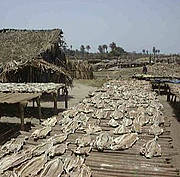World’s poorest on front line in climate change fight
24 July 2008 | News story
Climate change is already happening – and it hits poor people most. The effect of more frequent hurricanes, floods and droughts on developing countries is devastating, as this year’s cyclone Nagris proved again in southern Myanmar, leaving over 130,000 people dead or missing.
To protect the world’s poor against today’s more frequent extreme weather events, some US$ 2 billion is required according to the Internacional relief agency Oxfam. However, commitments so far only total US$173.
The need for innovative means to mitigate climate change impacts and help poor countries adapt is high on the agenda of the World Conservation Congress, held by IUCN, the International Union for Conservation of Nature from 5-14 October in Barcelona.
Key Issues:
- In 2007, there were 950 natural catastrophes in 2007 compared with 850 in 2006, according to Munich Re, one of the world’s largest insurance companies. This is the highest number recorded since the company started compiling annual disaster reports in 1974.
- The burden of the disasters fall on the poor who are least to blame for climate change. Benin, and Bangladesh, for example, are at particularly high risk from rising sea-levels and storm surges, yet their per capita contribution to greenhouse gas output is one eightieth that of the United States, according to the British Institute of Development Studies.
- “What worries us the most is the impact on the poorest countries which have the least capacity to respond to the challenge,” said Yvo de Boer, secretary of the Convention on Climate Change.
- A healthy environment can help people survive. Healthy mangrove forests and coral reefs, for example, can serve as barriers and prevent coastal erosion; a solid forest cover prevents flooding in times of heavy rainfall.
- “There are positive examples of local level adaptation to the impacts of climate change, such as replanting mangrove forests that can serve as buffers against more frequent storms. But to implement these solutions on a larger scale, substantial financial support is required,” says Ninni Ikkala, Climate Change Officer at IUCN.
Upcoming media products:
6 August – International Press Release – Primates Red List update
12 August – International Press Release – Cetacean Red List update
Spokespeople:
Julia Marton-Lefèvre, IUCN’s Director General.
Ninni Ikkala, IUCN Climate Change Programme
Media team:
Brian Thomson, IUCN Global Communications, m +417972182326, e brian.thomson@iucn.org.
Carolin Wahnbaeck, IUCN Global Communications, m +41 79 85 87 593, e carolin.wahnbaeck@iucn.org
World Conservation Congress, Barcelona (5-14 October)
The World Conservation Congress (WCC) brings together 8,000 leaders from the public sector, government, business and non-governmental organizations for what is the premier summit on sustainable development in 2008. Over ten days they debate the best ways to tackle environmental and development challenges. They share pragmatic solutions to pressing issues. And they commit to collaborative action.






